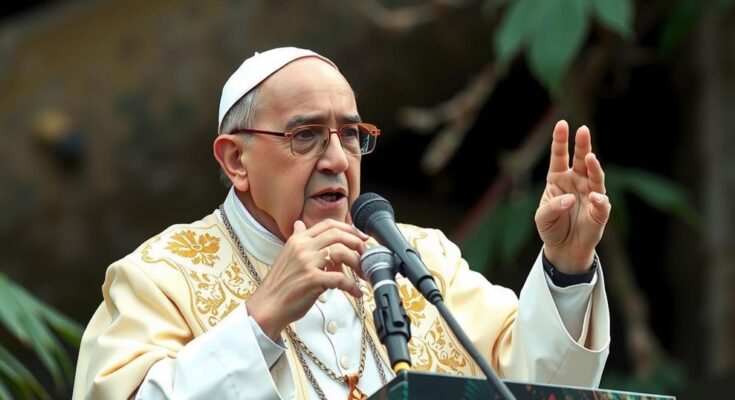During his visit to Papua New Guinea, Pope Francis called for the country’s natural wealth to benefit all citizens rather than a select few, highlighting the severe poverty despite abundant resources. He urged leaders to prioritize local people’s needs in resource distribution and expressed hope for the cessation of tribal violence affecting thousands. The Pope’s statements resonate with the ongoing struggle for equitable resource management and social peace in the nation.
Pope Francis made a significant visit to Papua New Guinea, advocating for the equitable distribution of the nation’s abundant natural resources. Addressing political and business leaders, he remarked that the wealth of gold, copper, natural gas, and timber should serve the entire population rather than a select few. Despite its resource-rich status, Papua New Guinea continues to face severe poverty, with statistics indicating that a substantial portion of the 12 million residents lives in extreme hardship, and access to basic services remains limited.
The Pope emphasized the moral responsibility to include local communities in the benefits derived from resource extraction. He encouraged stakeholders to prioritize the needs of the people when managing proceeds from these ventures. This message resonated with many citizens, particularly as they express frustrations over inadequate governmental support despite significant revenue from natural resources. Young individuals like Jonathan Kais articulated hope that the Pope’s remarks would motivate leaders to enhance public services.
The economic disparity in Papua New Guinea is stark despite a notable increase in its GDP, which grew over a third from 2009 to 2018 due to resource exploitation. However, this growth has failed to translate into improvements in the living conditions of ordinary citizens, further highlighting ongoing challenges.
In addition to economic concerns, Pope Francis addressed the escalation of tribal violence that has plagued the Highlands. He urged communities to cease hostilities that have resulted in numerous deaths and significant displacement. With reports indicating that about 100,000 individuals have been displaced due to tribal conflicts, the Pope expressed hope for a cessation of such violence to foster peace and development in the region.
The contemporary violence, often fueled by modern weapons and exacerbated by social issues such as population growth and unemployment, calls for attention and resolution. The Pope’s visit serves not only to highlight economic grievances but also to promote peace within a nation undergoing social turmoil.
The visit of Pope Francis to Papua New Guinea comes at a time when the country is grappling with the paradox of being resource-rich yet facing alarming poverty levels. Although the nation possesses vast reserves of minerals and gas, many citizens feel that the benefits of these resources fail to reach them, and the economic growth does not alleviate their hardships. Additionally, tribal violence remains a persistent issue, complicating the socio-political landscape and hindering development opportunities for the populace.
Pope Francis’s visit to Papua New Guinea underscored critical issues relating to economic equity and social peace. His calls for natural resources to benefit all citizens resonate deeply in a nation marked by vast wealth paradoxically shadowed by pervasive poverty. Moreover, the plea for an end to tribal violence reflects the urgent need for stability, allowing local communities to flourish in a peaceful environment. The Pope’s messages aim to inspire change that prioritizes the wellbeing of the entire community.
Original Source: www.voanews.com




